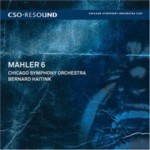Haitink begins this recording, at least his fourth Mahler Sixth, with an incredibly slow march, not necessarily a problem given the excellent low strings of the Chicago Symphony. However, this means that he has to conjure up some extra degree of color and contrast along the way–and Haitink fails to find either. For example, the sweeping and lyrical second subject–the so-called “Alma theme”–is almost as earthbound and world-weary as the opening trudge. In the slow movement, placed third, Haitink and his Chicagoans find too little sense of outdoor freshness and liberation at the first “Alpine” episode. This is a pity, because the CSO violins really shine in the climactic passage toward the end of the movement. I could forgive much of this (the scherzo is a vertiable poster-child for dour sluggishness) if only Haitink had delivered a knock-out performance of the finale. After all, and regardless of movement order, the Sixth very much remains a finale-driven symphony.
Instead, clocking in at 34:10, Haitink hands us one of the dullest and most poorly conceived finales imaginable–merely so-so hammer blows, a near total absence of cumulative tension, and the same lack of contrast between subjects as in the first movement. Again, slow isn’t necessarily bad. Sinopoli on DG was even more so (barely), but Haitink finds none of the sleazy decadence that made the Sinopoli fascinating in spots, much less the steely determination that made John Barbirolli sound so “right” more than four decades ago for EMI. Instead, this latest snooze-fest makes Haitink’s sloppy and unidiomatic French performance, released a couple of years ago, sound like a thrill-ride at Disneyland.
If it’s Haitink you want for Mahler 6–and he’s never conducted it as well as the best of the competition–his first recording with the Concertgebouw remains his best offering. His Berlin remake, while also dull for the first two movements, has a far better slow movement and finale than this one. If it’s the big guns of an American orchestra that appeal to you, I strongly urge you to stick with Eschenbach or Michael Tilson Thomas. While neither conductor is perfect (who is?), they’re both far more interesting and better recorded than Haitink is here. It’s no great pleasure to dismiss someone who has been held in such high esteem as a Mahlerian for nearly five decades. But the well-meaning folks at CSO Resound, possessing one of the greatest Mahler instruments on the planet, should have waited for a conductor with a pulse to inject some color, turmoil, and heroic striving into a symphony whose very point in being tragic is that it shouldn’t sound as though it has given up the ghost before the second bar.
































